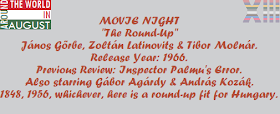Cast:
János Görbe (János Gajdar), Zoltán Latinovits (Imre Veszelka), Tibor Molnár (Kabai), Gábor Agárdy (Torma), András Kozák (Ifj. Kabai), Béla Barsi (Foglár), József Madaras (Magyardolmányos), János Koltai (Béla Varju), István Avar (Vallató I), and Lajos Őze (Vallató II) Directed by Miklós Jancsó.
Review:
"...I and the friends with whom I make my films don't think of the viewer as a child but as an adult, and we would like to be partners in an equal discussion with him. We don't want to tell him what to think."
Well, sometimes the writer and reader need a little history lesson. In the spring of 1848 (March 15 to be specific), the Revolution of 1848 began in the empire of Austria and its land of Hungary. The result of the revolution at the end of the following year was a suppression of Hungary that saw numerous rebels and generals executed alongside the exile of people such as Lajos Kossuth. The scattering included highwaymen such as Sándor Rózsa, who is mentioned in this film as someone that others believe is in the prison camp for supports of Kossuth. It seemed important to mention this when talking about Hungary, which at the time of The Round-Up (released in its native title of Szegénylegények in 1966) was under socialist rule as the Hungarian People's Republic (after various changeovers in the prior century, obviously), which included a repression of revolution within the state in 1956 (with beginnings in October 23) by the Soviet Union. Incidentally, public holidays exist in Hungary to commemorate both starts of the failed revolutions. At any rate, it certainly matters to also talk about the film with relation to its place within the director's ambitions in such a lengthy career. Born with roots in both Hungary from his father and Romania from his mother with an upbringing in Transylvania, Jancsó had ideas of taking up law as a career before later settling with taking up studying in the Academy of Theatre and Film Arts. He did a number of documentary work and eventually features starting in the 1950s, but his first noted film came with My Way Home (1964), which dealt with a teenaged deserter of the army in Hungary (as aligned with the Axis powers) near the end of World War II. Jancsó continued his run of noted international films within The Red and the White (1967), which was actually a Hungary-Soviet Union production commissioned to mark the 50th anniversary of the October Revolution but was turned by him into being set two years later in 1919. His later films have their own notations (such as Red Psalm (1972), which also loosely dealt with the 1848 revolution on a different wavelength), albeit on a different approach with long takes that also saw him move abroad for a time within France. In an interview relating to his films up to the point of the 1980s, he stated that his films have had one general theme within "an exploration of the state of society in which some people always try to exploit others." Jancsó died at the age of 92 in 2014.
The film was written by Gyula Hernádi, who wrote for a number of Jancsó features. There is quite a scale of landscape told within the violence and power shown through such a striking feature within the distance one feels within what is shown on screen. The long and winding road of wavering rules in this cat-and-mouse game of oppressor and the oppressed extends to the viewer for a curious viewing, one with players that come and go as if they were being displaced on a chess board. The focus for a good deal of the film involves a man (played well in torment by Görbe) who is trying to avoid death by trying to find someone who has killed more people than he did, which can only go so far when dealing with what happens to those who inform on others. The final gambit that pulls everything together is more of a fit of irony, one that rallies the oppressed together in a fit of camaraderie and togetherness only to see that those who had aligned together with the man of the past in rebellion are by default condemned to die at the hands of the people they basically confessed to. It has been suggested that the film was seen in part as an allegory for the 1956 revolution, and Jancsó had to make a statement before screening the film at the Cannes Film Festival denying the implication (although obviously you can't take it at face value). No matter how you view the torture of the mind and in physicality, what you have here is a fascinating film that shows the overarching power of doom that comes from the inevitability of all that comes from finding what one is looking for in the rallying cry of masses.
Overall, I give it 9 out of 10 stars.
Next up: It was certainly time for a Hong Kong film...starring Jackie Chan.


No comments:
Post a Comment